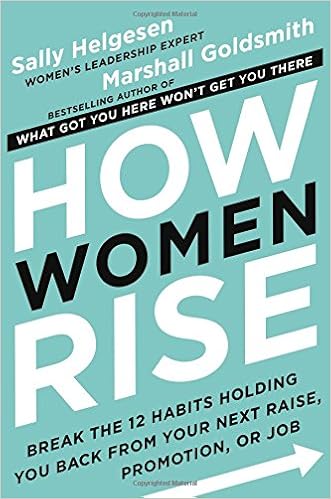 How Women Rise: Break the 12 Habits Holding You Back From Your Next Raise, Promotion, or Job
How Women Rise: Break the 12 Habits Holding You Back From Your Next Raise, Promotion, or JobThe habits and use cases in this book describe me to a T. I am that predictable/average...!
Goldsmith had published best selling What Got Your Here Won't Get You There but the behaviors discussed in the book geared towards men.
For example, men tend to claim credit (v emphasizing team) and focus on the need to be right. Women tend not to have these challenges.
Mission statement - help me think clearly about my future, feel more confident & prepared, mark me as serious, a potential player, someone to watch, move beyond the trap of expecting to be spontaneously noticed
Make companies & teams become more efficient by developing processes that drive results. Helping those in the Chinese community who came to America with nothing to make a better lives for their children.
From my mission statement, figure out which habit to work on first.
Quotes that resonated:
"...behaviors that helped you get where you are now can hold you back from advancing to the next stage." - I need to say no more. be curt. be direct. stop apologizing. stop minimizing
Habit 1, Reluctance to Claim Your Achievements
- concerned about wanting to appear 'authentic', not a brown noser... that's just me being stubborn & judgmental...
- just say "thank you" whenever praised, without adding any minimizing statements
Habit 2, Expecting Others to Spontaneously Notice & Reward Your Contributions
- am surprised when higher level execs don't know who I am..., have not heard of me...
- use case with male attorney made partner since concerned he'd leave, talked about it from day one & surprised when found out Maureen wanted to be partner since she had never mentioned it
Habit 3, Overvaluing Expertise
- especially since I have never coded anything in my life & am managing software engineers...
"...the top jobs always require managing and leading people who have expertise, not providing expertise yourself."
"First, learning every detail to perfection uses up a lot of bandwidth, leaving you little time to develop the relationships you need to move ahead. Second, your efforts to do everything perfectly usually have the effect of demonstrating that you're perfect for the job you already have."
"Of course you need to deliver on your work, but you've got to think bigger than that. It's rare to get promoted because you've done your job flawlessly. You're most likely to get promoted because people know you and trust that you could be contributing at a higher level. And because you demonstrate that you're ready for a challenge."
"...as she grew more experienced, Ana began to see that having answers was less important as she moved higher, while forging relationships mattered more. She says, 'You can't be the expert when your domain is expansive and your span of control is broad. You need to rely on others. Plus you have less time to get up to speed on details. The upshot is, you have to trust people and they have to trust you. And trust is built in the back-and-forth of engagement, not by knowing every last little thing."
Personal authority - rooted in confidence you inspire in others. "Expertise and connections can help establish personal authority, but there's always another element: a strong presence, a distinctive cast of mid, a way of speaking and listening that inspires loyalty and trust, or an unusual degree of gravitas. Personal authority is what sets the most successful leaders apart, whether or not their authority is tied to position."
"By letting go of expertise, Ana was ironically finally able to feel fully confident as a leader and harness the power required to rise."
Habit 4: Building Rather Than Leveraging Relationships
Why women are uncomfortable with the notion of leveraging a relationship...
"I don't want others to think I'm using them." - that's me...!!
"...when men build relationships at work, they're usually very focused. They pursue people they believe can help them accomplish their objectives." Need to leverage relationships to pursue my goals.
Leverage is reciprocal. "The underlying premise is: You help me and I'll help you."
"...engaging leverage is a subtle way of suggesting that you're going places... Refusing to engage in this way on the grounds that you don't want to "use" the other person suggests that you don't see yourself as having this kind of power. And that you can't imagine the other person would perceive an advantage in having a relationship with you."
"Either you're a wonderful person with pure intentions who gives no thoughts to your own advancements, or you're a conniver who uses others to achieve your ends. Either you're motivated by the desire for disinterested friendship, or you're only out for yourself. This kind of framing allows for no middle ground, no way of being a good and helpful person who is also capable of pursuing her own self-interest."
Habit 5: Failing to Enlist Allies From Day One
Men in new positions think, "Who should I connect with to make this job a success?" "They view the path to success not as a matter of what or how, but of who.
The result of this who-centric approach? More support. Better positioning. Greater visibility. Less isolation."
Dianna, attorney new to maritime law, running the division. Her boss: "You wouldn't be here if you weren't a good lawyer, but you're not here to be a good lawyer. You're here to be a leader. That's your job."
Turning point in her career: "Instead of seeing myself as a smart lawyer who scored points based on knowledge of the law, I began to see myself as a leader who brought out the best in people and could help them connect across continents."
Habit 6: Putting Your Job Before Your Career
"...focusing on your job at the expense of your career. You're looking at what's on your plate now instead of seeing the big picture. You're sacrificing your long-term prospects on the altar of today."
"Managing a team superbly ultimately proves you have great skills as a manager. But building strong outside networks is a promotional skill aimed at getting recognition for the larger organization. So while women are honing their management skills and sending the message that they're wonderful managers, their male colleagues are busy building promotional skills and sending the message that they're terrific promoters."
"This doesn't mean you only think about the future instead of appreciating where you are now. But it does mean you assess the value of every job not just in terms of how it could serve your long-term self-interest."
"So if you're stuck in the loyalty trap, or have a problem admitting self-interest, or if you make a big point of disdaining the politics you see other people play, you can benefit by considering how well these attitudes really serve you, how suited they are for getting you where you want to go. Women who use their jobs as a way to avoid thinking about their careers often have a problem admitting ambition. But the world needs ambitious women - why not you?"
Habit 7: The Perfection Trap
"...women are especially vulnerable to the perfection trap, the belief that they will succeed if they do their job perfectly and never mess anything up. While women in general tend to be seen as better leaders than men, they are often undermined by their tendency to give themselves a hard time, a habit rotted in the desire to be perfect. The result is that even high-achieving women tend to take failures deeply to heart, get tangled up in self-blame, and stew over mistakes instead of moving on."
"Risk-taking requires being open to failure... The desire to be perfect, by contrast, keeps you focused on what you can control. This narrows your horizons and demonstrates insecurity instead of the confidence in the future that being an effective leader requires."
"By letting to of expertise, Ana was ironically finally able to feel fully confident as a leader and harness the power required to rise."
Dana notices the details, but considers it in the larger context. "She's a perfectionist by nature...but she has a broad perspective and is very tolerant with people. She works incredibly hard but is often the first to let go when things don't turn out as planned. And she has a great sense of humor so she can handle criticism and put people at ease. It all comes down to her being a confident person.
Julie notes that Dana has two skills most perfectionists lack. She's good at delegating and she knows how to prioritize."
Habit 8, Disease to Please
Disease to please can "undermine your ability to make clear decisions because you're always trying to split the difference among competing needs in hopes of creating consensus or avoiding giving offense. This can impair your judgment and leave you vulnerable to manipulation by people who know how to use guilt to get others to accommodate their needs.
It can rob you of the capacity to act with authority for fear of disappointing others or making them even temporary unhappy. It can make you an unreliable advocate or ally because you are so easily swayed. It can distract you from your purpose, squander your time and talents, and contribute to your general stuckness."
"...while the need to please may serve you in the earlier stages of your career, it will impeded you a you move higher, eroding your capacity to demonstrate leadership and serving as the ultimate tool for giving your power away."
In a senior position, "she couldn't avoid stirring up resentment. It comes with the territory, no matter how nice you try to be. You have to make peace with that if you're in a leadership position."
"Nancy had always viewed herself as a naturally helpful person... her over-involvement had the effect of making everything about her. This is usually shocking to pleasers because it doesn't fit with the 'I'm such a nice person' narrative they carry around in their heads."
Habit 9, Minimizing
Acknowledging someone's presence by making yourself smaller, pointing someone to a seat, move over so person can sit, or come in late & take seat at back of room - men don't do this...
"...when you draw in your arms and legs, tighten your body, hunker down, or move aside - you undermine your ability to project authority and power." That's right, Power Posing...
Word minimizers: just, quick, we; phrase minimizer: may be beside the point. "...women are more likely then men to downplay their certainty when they speak, hedging assertions and proactively acknowledging that others may hold different points of view."
Too many words, volunteering explanations when not asked - sounds like you're hedging. Be direct and fewer words the better.
"...conveying uncertainty is a good way to assure you will not be heard. People in positions of power tend to read uncertainty as a lack of commitment or preparedness. Given the no-win nature of dilemma - you're either seen as arrogant or lacking in commitment - it's usually a good practice to just come out and say what you mean."
"...The key component to leadership presence is the opposite of cosmetic: it lies in the capacity to be fully present. Present for a task, for a conversation, for the moment, for an opportunity. Present for your larger purpose in the world."
Being present is the most powerful way to connect with people - e.g. when a child knows you are not present/checking your phone, an adult surely will too.
Women struggle to be heard, but study shows that women "receive as much attention as men when speaking on public if (and only if) they are perceived as being fully present. Being present also has the effect of making women seem more credible and authoritative... the ability to rest in the moment and hold your space is vital for women seeking to project leadership presence."
Push back against compulsive multitasking, a practice women often seem to take perverse pride in...fragmented attention is a highly effective minimizer. Multitasking also diminishes you by giving the impression that you're overly responsive to random events.
Stop speaking after done, let there be silence on a call. When do speak, confident, measured & authentic.
Habit 11, Ruminating
Ruminants are animals such as cows, goats, sheep, etc. that live exclusively on plant food and struggle to extract sufficient protein from their diet. Ruminating and dwelling over mistakes, regrets and negative experiences is called rumination - adds no value.
"Rumination is counterproductive for two reasons. First, it always makes you feel worse. And second, it gets in the way of your ability to resolve your problems."
"Men are more likely to say, "I made a mistake. We all do. It is time to move on."
Men move on. Gina wonders, Does Peter think my idea is stupid? Was I a jerk for bringing it up? And do I really belong in the room with these hotshot guys? In other words, I'm heading down the rabbit hole.
Rumination can be a killer - at the executive level, need to be seem, and be, confident and decisive.
Men move on, so I can move on too.
Habit 12, Letting Your Radar Distract You
Radar may also be in part responsible for women's tendency to give themselves a hard time. Being hyperaware of other people's reactions can feed the fires of self-doubt and cause you to overthink your actions.
"I'm very confident one-on-one... But I get self-conscious in larger groups because there's so much going on, so many reactions to read. This can make it hard to focus on what I'm trying to do." Taylor realized she'd been so busy trying to read the audience, that she'd lost sight of her presentation's contents and purpose in giving her talk."
Who cares if someone looks grumpy or doesn't seem excited about something - could have had a bad day, not always about me.
My To-Don't List:
1. Pass Judgement - Don't! Judging myself when I fall short of my expectations, second-guessing myself, berating my lack of technical experience or not making progress as quickly as I'd like. It's negative and keeps me focused on the past instead of the present.
Forgiving myself starts with letting go of the either/or paradigm - e.g. someone is good or bad
Learn to say oh well! Oh well, I mess up. Oh well, I don't have a technical background. On well, I misinterpreted what someone said. Oh well, I misspoke.
"Passing judgment is often the engine for the kind of gossipy conversations that can make a workplace toxic. It may feel satisfying to share negative views of co-workers...but judgmental observations waste your time and create negative energy that saps your spirits and can alienate others.
Gossip also diminishes you as a leader since accepting others with their flaws is the firsts step toward figuring out how to deal with them more effectively, which is precisely what good leaders do. The more clearly you see people, the more strategic you can be. Clouding your response with negative assessments can only get in your way."
"Your load will be lighter if you leave your judgments in the stream instead of carrying everyone's behaviors around with you."
2. Avoid minimizing words like no, but or however; in general, few words the better
3. Know my purpose - define it, speak it, share it, be intentional in its pursuit
4. Listening - can't listen when speaking; also, can't listen when preparing to speak. Listening is a two-step process. There's the part where you listen to what the other person has to say and then there's the part where you respond. They do not overlap.
Don't nod my head when someone's talking since that gets interpreted as agreement.
5. The magic of Thank You. Works magic in many situations: closure on difficult conversation, stops the cycle of tit for tat, it's disarming - even people who are defensive will soften, makes others feel good, demonstrates humility, nobody can argue or push back on it

















